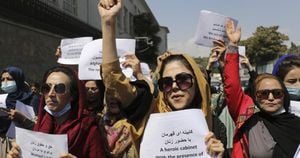Australian Senator Simon Birmingham recently announced his retirement from politics, marking the end of his long-standing public service career. Serving as the Liberal Party’s senator for South Australia since 2014, Birmingham's decision has left many reflecting on his impactful tenure.
Birmingham first entered the Senate during what was known as the Abbott government, which saw him hold various significant roles, including Minister for Education and Training, and Minister for Trade, Tourism and Investment. His work during these terms was characterized by efforts to reform education funding and negotiations to bolster Australia's trade relationships globally.
His retirement was shared through social media, where he expressed gratitude for the experiences he gained over the years and the friendships he made. Birmingham emphasized his pride in representing South Australia and the opportunities he had to influence policies affecting his constituents. ‘I have always believed politics is about service to the community, and I’m thankful for every moment of it,’ he stated.
His exit from the political stage came at a time when the Liberal Party itself is trying to redefine its vision and restore its support following significant electoral losses. With the party still reeling from past challenges and the current state of Australian politics, Birmingham's departure could signal the start of a new chapter for both him and the party.
Political analysts have pointed out the potential impact of Birmingham's retirement on the Liberal Party’s strategies moving forward. Many see him as one of the party's key players during his time, often seen as the voice of moderation and reason within the party. Without his leadership, the dynamics within the Liberal Party may shift significantly.
Emma McBride, Labor MP, expressed her respect for Birmingham on social media, noting, ‘Regardless of party lines, Simon has always been incredibly committed to his work and the people he serves.’ This sentiment is echoed by many who have crossed political paths with him.
Looking forward, Birmingham’s retirement opens up potential opportunities for new leaders to emerge within both the Senate and the Liberal Party. With South Australia having its own distinct political climate, the upcoming nomination and election process will be pivotal. His successor will be expected to maintain and build upon the progress he has made, particularly concerning education and economic policies.
Alongside his political commitments, Birmingham has also hinted at plans to spend more time with family, particularly his children, who he says have grown up amid his public life. He openly acknowledged the sacrifices made during his years of service, stating, ‘It’s time for me to prioritize my family.’
Though Birmingham's political career is concluding, he leaves behind a legacy of public service, advocacy for trade reform, and educational contributions. His approach has often balanced hard-nosed negotiation with genuine care for community needs, attributes not easily replaced.
The political arena will undoubtedly miss Birmingham's seasoned approach, as he has served as both an effective communicator and strategist for the Liberal Party. Upcoming discussions within the party may need to reflect on how to fill the gaps left by his retirement, particularly on issues like trade, education, and bipartisan efforts.
It remains to be seen how Birmingham’s departure will reshape the political narrative, but one thing is certain: his contributions will echo within Australian politics for years to come. The path forward will need the input of new voices, and Birmingham’s exit marks both the end of a notable era and the beginning of another as Australia moves toward its next federal election.
For now, Simon Birmingham’s retirement symbolizes more than just one senator stepping down; it reflects the shifting tides of Australian political life. Those awaiting the next developments may find themselves caught up not only in the position vacated but also the ideological shifts yet to come within the Liberal Party and beyond.



